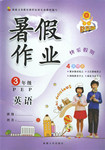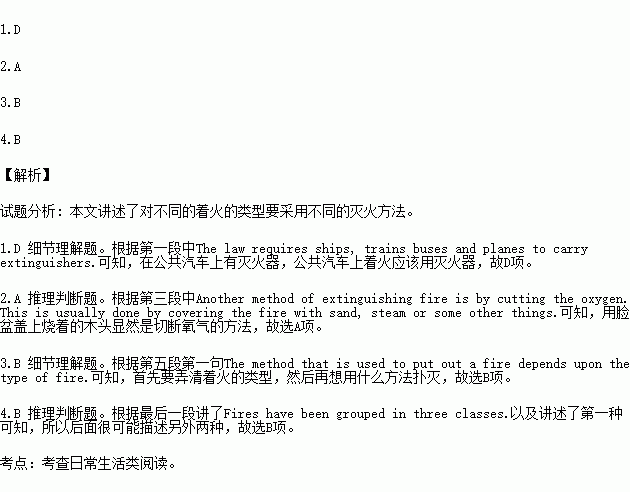题目内容
阅读下列短文 ,从每题所给的四个选项 (A、B、C、和D)中 ,选出最佳选项。
To extinguish (熄灭) different kinds of fires, several types of fire extinguishers have been invented. They must be ready for immediate use when fire breaks out. Most portable (手提式的) kinds operate for less than a minute, so they are useful only on small fires. The law requires ships, trains, buses and planes to carry extinguishers.
Since fuel, oxygen and heat must be present in order for fire to exist, one or more of these things must be removed or reduced to extinguish a fire. If the heat is reduced by cooling the material below a certain temperature, the fire goes out. The cooling method is the most common way to put out a fire. Water is the best cooling material because it is low in cost and easy to get.
Another method of extinguishing fire is by cutting off the oxygen. This is usually done by covering the fire with sand, steam or some other things. A blanket may be used to cover a small fire.
A third method is called separation, which includes removing the fuel, or material easy to burn, from a fire, so that it can find no fuel.
The method that is used to put out a fire depends upon the type of fire. Fires have been grouped in three classes. Fires in wood, paper, cloth and the like are called Class A fires. These materials usually help keep the fire on. Such fires can be stopped most readily by cooling with water.
1.If a fire breaks out on a bus, which of the follow should be ready there for you to use?
A. Sand. B. Water.
C. A blanket. D. An extinguisher.
2.To cover a small piece of burning wood with a basin(盆) in order to stop the fire is an example of ________.
A. cutting off the oxygen B. reducing the heat
C. removing the fuel D. separating the fire
3.In choosing how to put out a fire, we should first be clear about ________.
A. when it breaks out B. what kind it is
C. how it comes about D. where it takes place
4.What would the author probably discuss in the paragraph that follows?
A. Another type of extinguishers B. Another class of fires
C. How fires break out. D. How fires can be prevented.
 第三学期赢在暑假系列答案
第三学期赢在暑假系列答案 学练快车道快乐假期暑假作业新疆人民出版社系列答案
学练快车道快乐假期暑假作业新疆人民出版社系列答案
